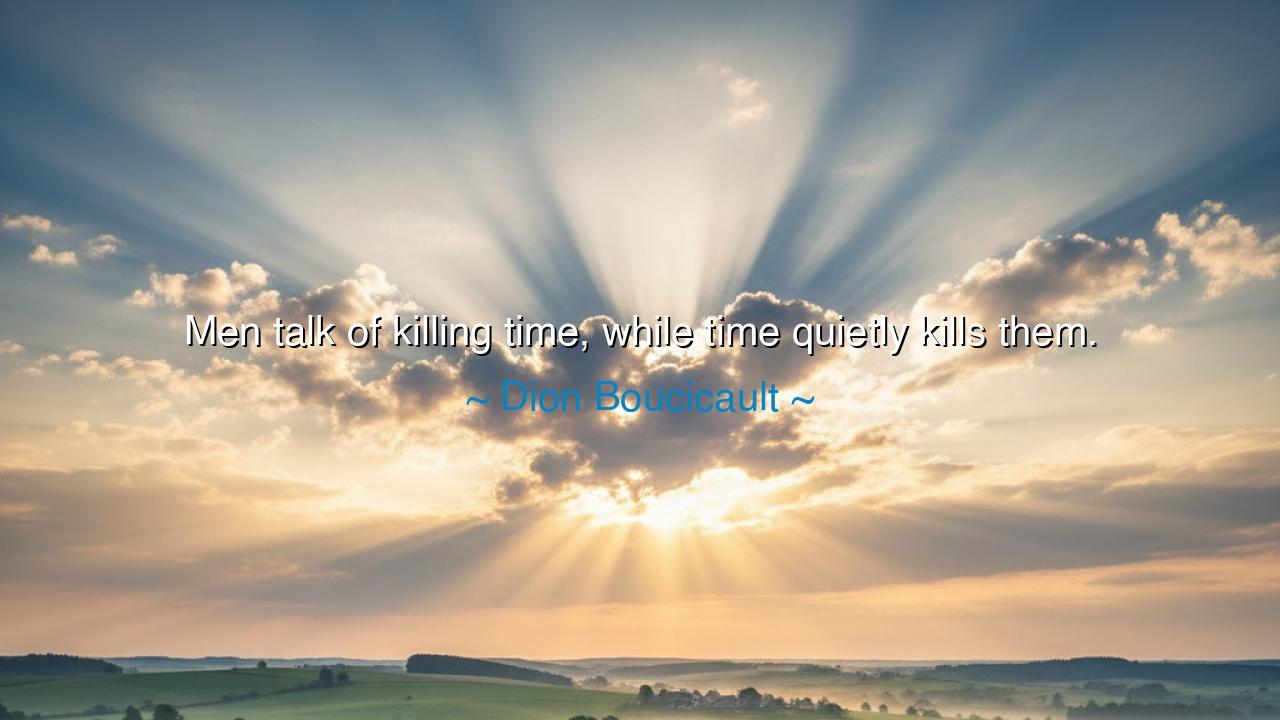
Men talk of killing time, while time quietly kills them.






Dion Boucicault, the dramatist of Ireland, gave to us a line sharper than any stage sword: “Men talk of killing time, while time quietly kills them.” At first it seems a jest, a clever twist of phrase, but within it lies a truth older than the pyramids: that time is not a servant to be squandered but a master that none can resist. Men boast that they are passing the hours, amusing themselves, idling their lives away; yet all the while those very hours are passing them, carrying them toward the grave.
The meaning of this truth is stark: life is measured not in years but in moments, and every moment spent heedlessly is a treasure thrown into the sea. To speak of “killing time” is to forget that time is the very breath of our being. It cannot be slain by man, nor halted, nor slowed. It flows as a river from eternity, sweeping every soul into its current. Those who waste it imagine themselves masters of leisure, but they are, in truth, captives of decay.
History abounds with warnings. Consider the tale of the last days of the Roman Empire. While enemies gathered at their gates, many nobles wasted their hours in feasts, games, and idle pleasures. They thought they were merely killing time—but it was time that killed Rome. Each wasted hour weakened the state, each neglected duty hastened the fall. By the time the invaders entered the city, the empire had already died, slain not only by swords but by squandered days.
Yet there are brighter examples as well, men and women who treated every hour as sacred. Leonardo da Vinci, restless in curiosity, filled his hours with study, invention, and creation. Though he too was mortal, and time claimed him as it claims all, his use of the fleeting hours left behind works that seem eternal. Where others wasted their lives in idleness, he transmuted hours into light, proving that while we cannot master time, we may yet honor it.
The deeper wisdom here is that time is not our enemy, though it brings death; it is our teacher, for it gives us urgency. To know that our days are limited is to know that each day is precious. To waste them is to dishonor the gift. Boucicault’s words remind us not of despair but of vigilance: to live awake, to live deliberate, to cease boasting of “killing time” when it is we who are fragile, and time who is eternal.
Therefore, O listener, the lesson is this: do not speak idly of wasted hours. Guard them as you would gold, for they are worth more than treasure. Fill your days with purpose, with love, with creation, with service. If you rest, rest with intention; if you labor, labor with heart. Let no day pass in forgetfulness, for every day is one step further along the path, and there is no returning.
Practical action follows: rise each morning and ask, “How shall I honor this day?” Set your hand to some good work, however small. Speak to those you love, create something that endures, or bring kindness where there is none. Even leisure, when embraced with joy and gratitude, is not wasted but sanctified. The key is not to idle without thought, but to live with awareness of time’s passage.
So let Boucicault’s words resound: “Men talk of killing time, while time quietly kills them.” Do not be one who boasts of mastery while being mastered. Instead, live as one who knows the river cannot be stopped, but can be navigated with honor. For though time will one day end your life, what you do with it before that hour will determine whether you are remembered as one who wasted the gift, or as one who used it to light the world.






AAdministratorAdministrator
Welcome, honored guests. Please leave a comment, we will respond soon